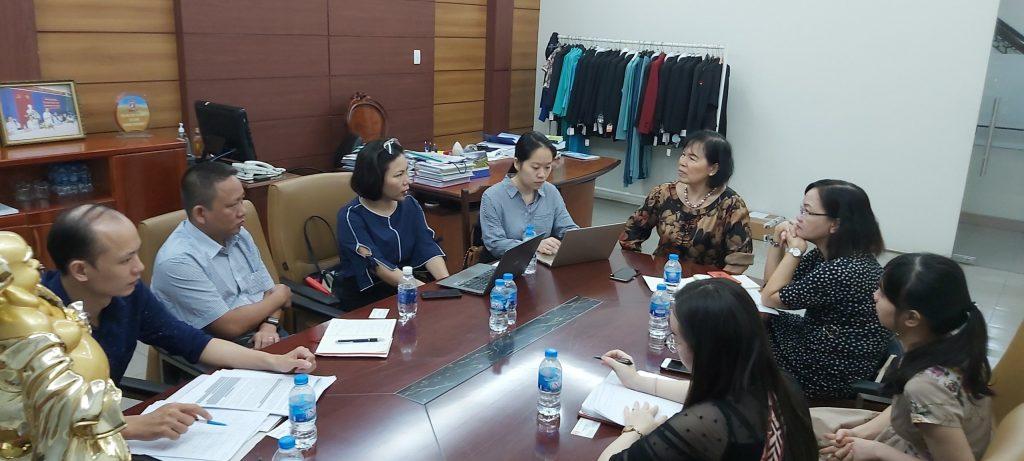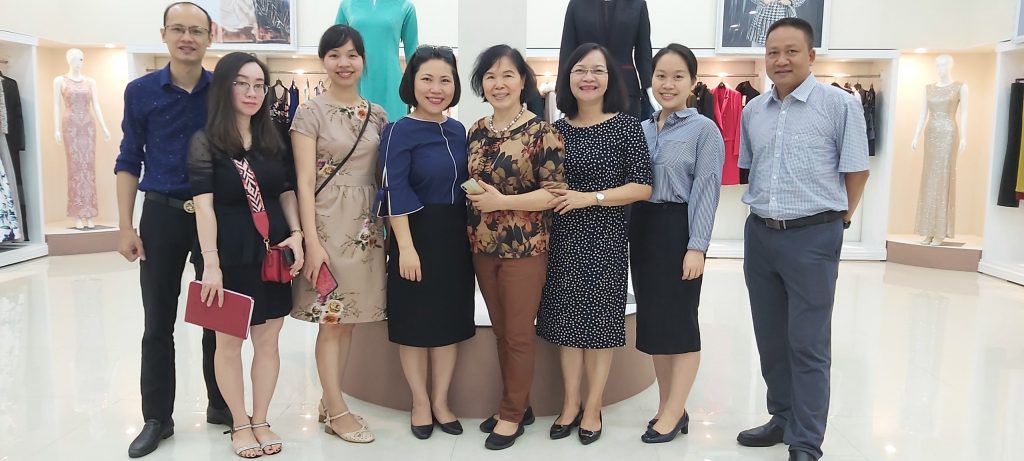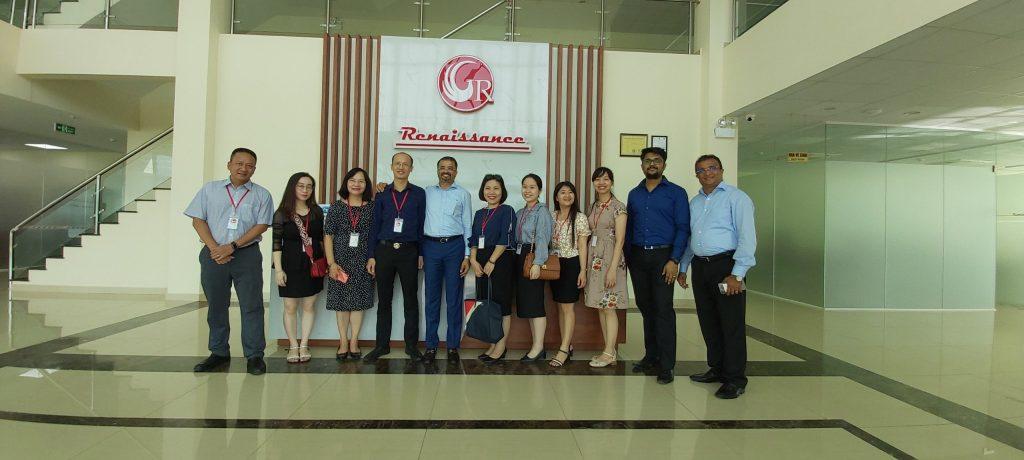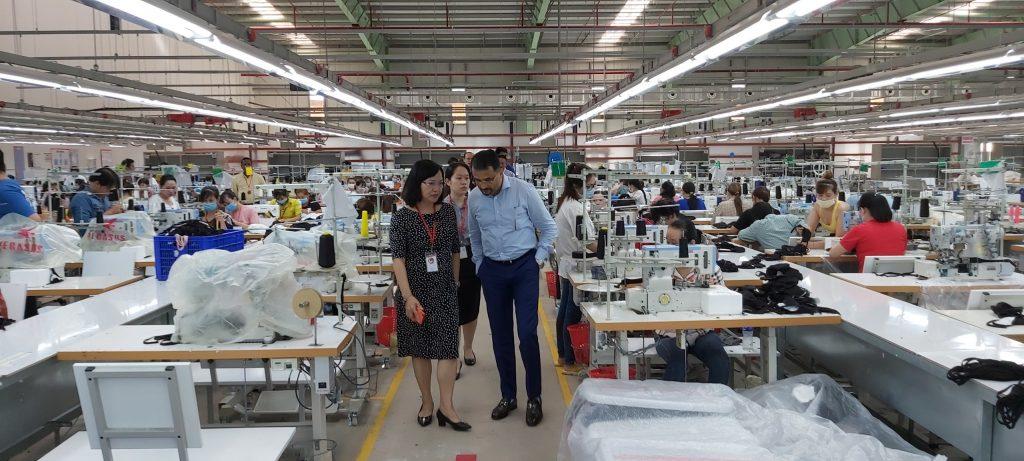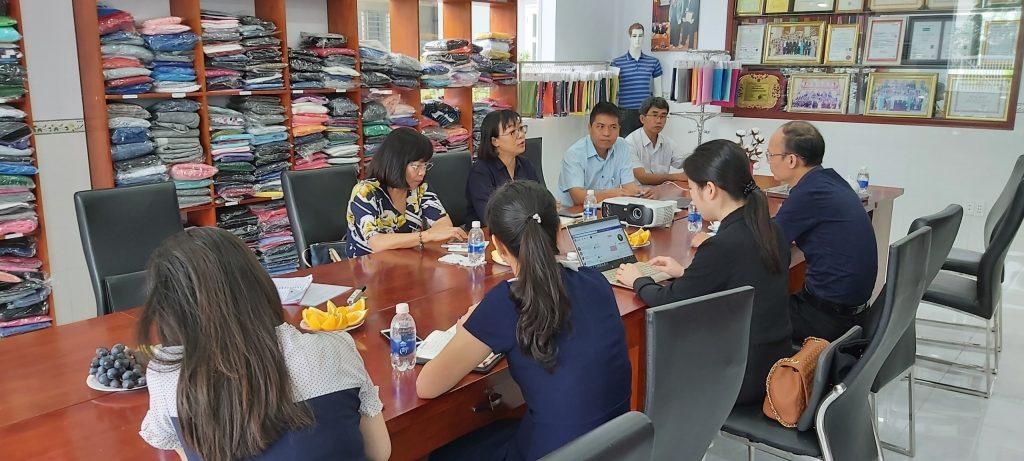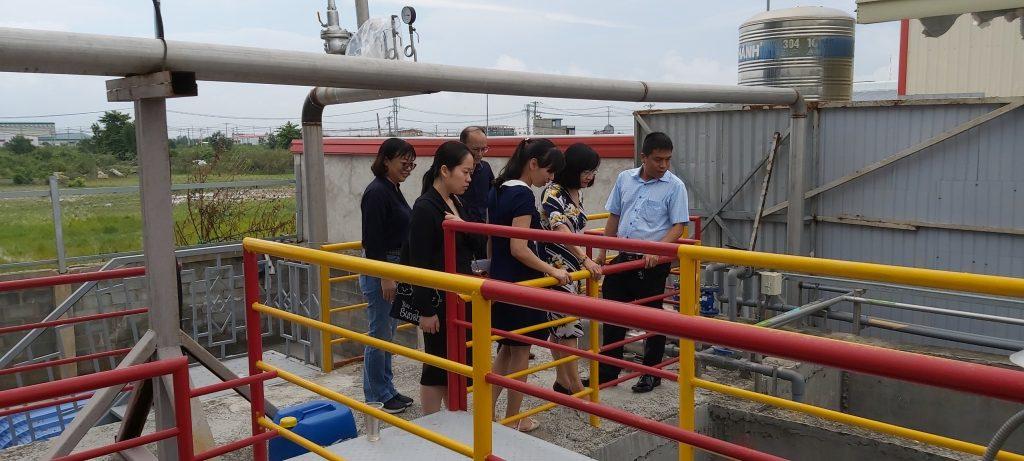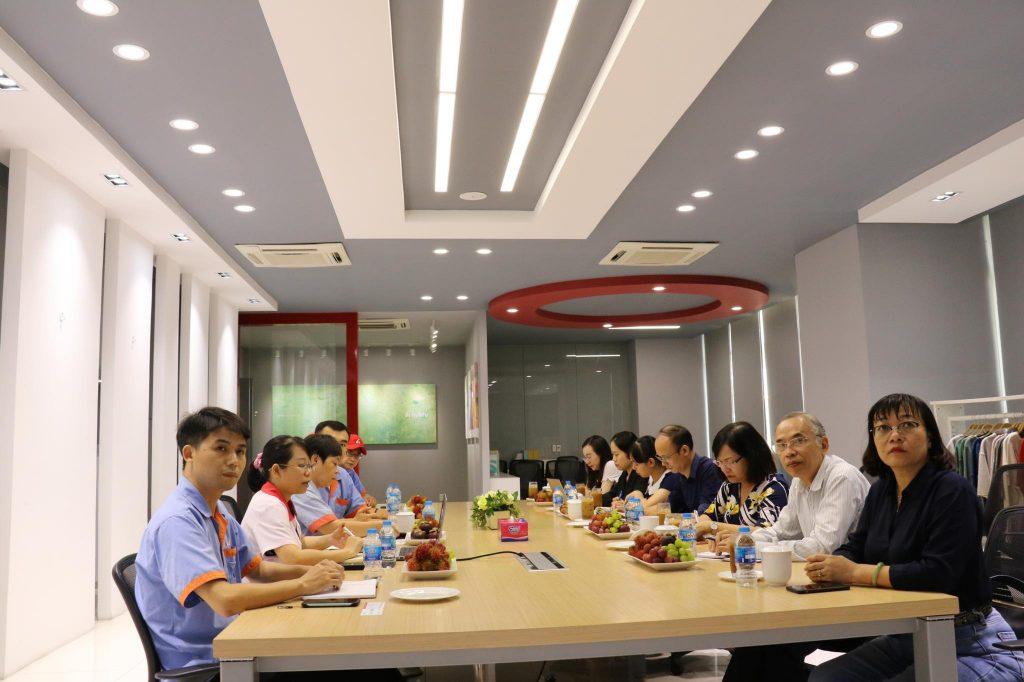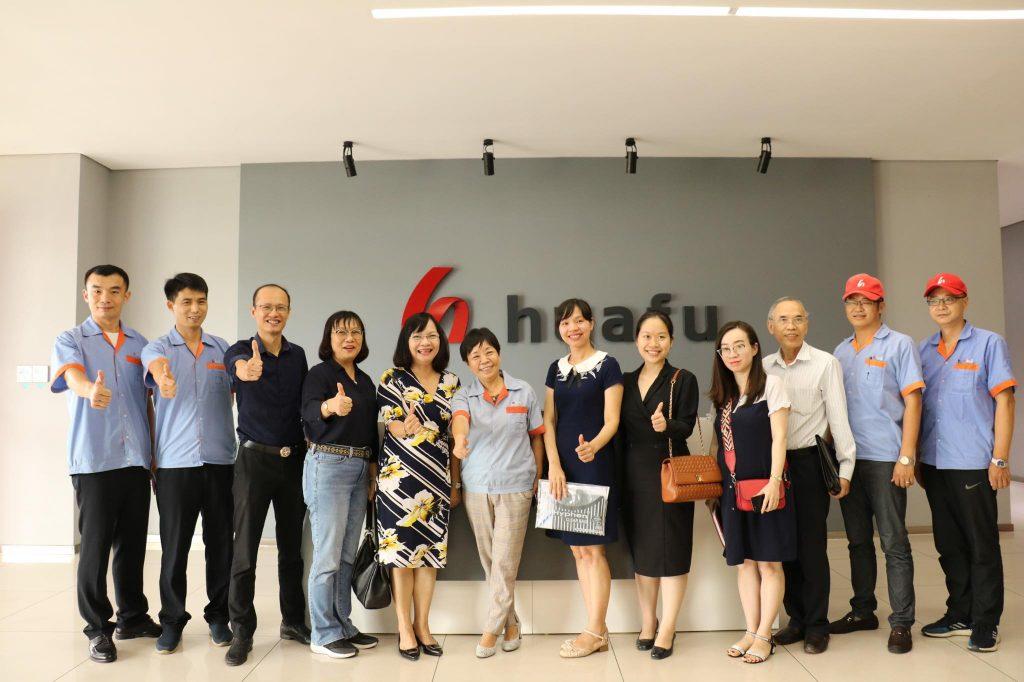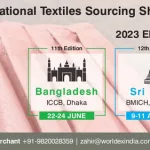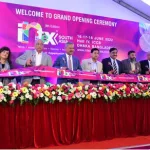From 14-16 July, 2020, the Vietnamese Government Office Delegation met with a number of businesses in the Mekong Delta to discuss the problems of procedures related to production and operation of these businesses, especially in terms of the impacts of the Covid 19 pandemic, and recommendations and proposals of the businesses were also raised at the meeting.
 Ms. Pham Thi Du - General Director of Tien Tien Garment JSC exchanged with the delegation
Ms. Pham Thi Du - General Director of Tien Tien Garment JSC exchanged with the delegation At the sample gallery of Tien Tien Garment JSC
Joining the Delegation were representatives of the Department of Administrative Procedures - Government Office, Private Economic Development Research Board - Prime Minister's Reform Advisory Council, LinkSME- USAID Project and Office of MOIT. Ms. Nguyen Thi Tuyet Mai - Deputy General Secretary of Vietnam Textile and Apparel Association (VITAS) joined the delegation. In Tien Giang province, the delegation met and worked with Tien Tien Garment JSC, Renaissance Fashion Garment Co., Ltd; In Long An, the delegation visited and exchanged with Trung Quy Textile and Garment Co., Ltd, Thanh Chau Investment JSC, Huafu Vietnam Industry Co., Ltd.
At the sample gallery of Tien Tien Garment JSC
Joining the Delegation were representatives of the Department of Administrative Procedures - Government Office, Private Economic Development Research Board - Prime Minister's Reform Advisory Council, LinkSME- USAID Project and Office of MOIT. Ms. Nguyen Thi Tuyet Mai - Deputy General Secretary of Vietnam Textile and Apparel Association (VITAS) joined the delegation. In Tien Giang province, the delegation met and worked with Tien Tien Garment JSC, Renaissance Fashion Garment Co., Ltd; In Long An, the delegation visited and exchanged with Trung Quy Textile and Garment Co., Ltd, Thanh Chau Investment JSC, Huafu Vietnam Industry Co., Ltd. Meeting with Leaders of Renaissance Fashion Garment Co., Ltd
Meeting with Leaders of Renaissance Fashion Garment Co., Ltd At the garment factory of Renaissance Fashion Garment Co., Ltd
At the garment factory of Renaissance Fashion Garment Co., Ltd Mr. Tran Van Quy – Chairman/CEO of Trung Quy Textile and Garment Co., Ltd discussed with the delegation
At each unit, in the spirit of openness and frankness, the delegation members listened to, discussed with business leaders, visited the factory, and shared difficulties and problems encountered by businesses. Common problems facing businesses and recommendations to be solved are as follows: high taxes paid for re-processing a part of export orders at other units, inequity between domestic enterprises and FDI, tax rates, social insurance, unemployment insurance, trade union funding, and customs procedures, etc.
Mr. Tran Van Quy – Chairman/CEO of Trung Quy Textile and Garment Co., Ltd discussed with the delegation
At each unit, in the spirit of openness and frankness, the delegation members listened to, discussed with business leaders, visited the factory, and shared difficulties and problems encountered by businesses. Common problems facing businesses and recommendations to be solved are as follows: high taxes paid for re-processing a part of export orders at other units, inequity between domestic enterprises and FDI, tax rates, social insurance, unemployment insurance, trade union funding, and customs procedures, etc. Visiting the waste water treatment area of Trung Quy Textile and Garment Co., Ltd
On account of the Covid 19 pandemic, all businesses are facing very difficult situations and due to some unsuitable regulations, no businesses have so far received any financial support. In addition, the solution offered by each local authority is quite different. Therefore, financial policies need to be adjusted for businesses to be able to receive government subsidies. The enterprises also proposed the Government, banks and tax agencies to deal with such things as: reducing lending interest rates, extending debts, extending tax, exempting social insurance and union fees during the pandemic. Regarding investment in dyeing and weaving, the State should have a policy of planning on textile and garment industrial zones (300-500 ha in area) in which there are only spinning, weaving, dyeing, sewing enterprises, not including the enterprises of other industries. In these industrial zones, waste water treatment facilities should be built to meet the requirements and standards set by the State. The State has a priority policy for standard industrial clusters and industrial parks. In addition, businesses also propose the issues related to human resource training, trade unions by industry, and investment procedures for industrial zones and industrial clusters.
Visiting the waste water treatment area of Trung Quy Textile and Garment Co., Ltd
On account of the Covid 19 pandemic, all businesses are facing very difficult situations and due to some unsuitable regulations, no businesses have so far received any financial support. In addition, the solution offered by each local authority is quite different. Therefore, financial policies need to be adjusted for businesses to be able to receive government subsidies. The enterprises also proposed the Government, banks and tax agencies to deal with such things as: reducing lending interest rates, extending debts, extending tax, exempting social insurance and union fees during the pandemic. Regarding investment in dyeing and weaving, the State should have a policy of planning on textile and garment industrial zones (300-500 ha in area) in which there are only spinning, weaving, dyeing, sewing enterprises, not including the enterprises of other industries. In these industrial zones, waste water treatment facilities should be built to meet the requirements and standards set by the State. The State has a priority policy for standard industrial clusters and industrial parks. In addition, businesses also propose the issues related to human resource training, trade unions by industry, and investment procedures for industrial zones and industrial clusters. Talking with Ms. Zhu Cui Yun - Chairman/General Director of Huafu Vietnam Industry Co., Ltd.
Talking with Ms. Zhu Cui Yun - Chairman/General Director of Huafu Vietnam Industry Co., Ltd. Article and photos courtesy: Nguyen Binh Source: VITAS
Article and photos courtesy: Nguyen Binh Source: VITAS
Ms. Pham Thi Du - General Director of Tien Tien Garment JSC exchanged with the delegation
At the sample gallery of Tien Tien Garment JSC Joining the Delegation were representatives of the Department of Administrative Procedures - Government Office, Private Economic Development Research Board - Prime Minister's Reform Advisory Council, LinkSME- USAID Project and Office of MOIT. Ms. Nguyen Thi Tuyet Mai - Deputy General Secretary of Vietnam Textile and Apparel Association (VITAS) joined the delegation. In Tien Giang province, the delegation met and worked with Tien Tien Garment JSC, Renaissance Fashion Garment Co., Ltd; In Long An, the delegation visited and exchanged with Trung Quy Textile and Garment Co., Ltd, Thanh Chau Investment JSC, Huafu Vietnam Industry Co., Ltd.
Meeting with Leaders of Renaissance Fashion Garment Co., Ltd
At the garment factory of Renaissance Fashion Garment Co., Ltd
Mr. Tran Van Quy – Chairman/CEO of Trung Quy Textile and Garment Co., Ltd discussed with the delegation At each unit, in the spirit of openness and frankness, the delegation members listened to, discussed with business leaders, visited the factory, and shared difficulties and problems encountered by businesses. Common problems facing businesses and recommendations to be solved are as follows: high taxes paid for re-processing a part of export orders at other units, inequity between domestic enterprises and FDI, tax rates, social insurance, unemployment insurance, trade union funding, and customs procedures, etc.
Visiting the waste water treatment area of Trung Quy Textile and Garment Co., Ltd On account of the Covid 19 pandemic, all businesses are facing very difficult situations and due to some unsuitable regulations, no businesses have so far received any financial support. In addition, the solution offered by each local authority is quite different. Therefore, financial policies need to be adjusted for businesses to be able to receive government subsidies. The enterprises also proposed the Government, banks and tax agencies to deal with such things as: reducing lending interest rates, extending debts, extending tax, exempting social insurance and union fees during the pandemic. Regarding investment in dyeing and weaving, the State should have a policy of planning on textile and garment industrial zones (300-500 ha in area) in which there are only spinning, weaving, dyeing, sewing enterprises, not including the enterprises of other industries. In these industrial zones, waste water treatment facilities should be built to meet the requirements and standards set by the State. The State has a priority policy for standard industrial clusters and industrial parks. In addition, businesses also propose the issues related to human resource training, trade unions by industry, and investment procedures for industrial zones and industrial clusters.
Talking with Ms. Zhu Cui Yun - Chairman/General Director of Huafu Vietnam Industry Co., Ltd.
Article and photos courtesy: Nguyen Binh Source: VITAS
